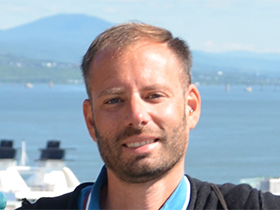Career Profile
Jörg Auernheimer:
Pursuing Pharmacovigilance: A Path for Safe Drugs
Many people outside the field are surprised that we do this kind of science, that we are really assessing the safety of the drugs, that we are systematically and continuously collecting all these reports and looking at them.
Reflecting on his educational and career path, Jörg Auernheimer, a global safety manager at Amgen in Munich, says that one of the biggest things he wishes he had known from the beginning—as a high school student—was the many and varied job opportunities in biotechnology. “Looking back, it would have helped me to know about all these different jobs in the biotech industry,” he explains. “Of course, you can think of obvious things like manufacturing the drug, becoming a sales rep, or supporting those positions in the IT department. But all the more hidden pathways—like clinical research, pharmacovigilance, and regulatory affairs—I didn’t have a clue these existed so I couldn’t fully prepare.” ABE spoke with Auernheimer about how he came to learn about pharmacovigilance (drug safety), including his early interest in science, his current job at Amgen, and thoughts on the future of the field.
How did you first become interested in science?
As a child, I was very interested in technical things, like how gadgets work; I’d disassemble things that were broken down to look inside. When I grew older, I moved toward chemistry and biology. My grandfather was a biologist, and he died before I was born, but there were all these books from him on the bookshelf so I got interested in these topics by reading about them. My grandfather first worked at a university and then actually became a science teacher for high school students.
What was your educational path?
I studied chemical engineering. From that I moved to a PhD in organic chemistry in peptide synthesis and started gaining exposure to the medical and biochemical side. I then got a postdoc position in the radio-pharmacy department of a university hospital, synthesizing tracers for the imaging of tumors and developing new targeted tracers. That was my scientific career before moving into pharmacovigilance.
Did you ever feel uncertain about your path?
No, it was always a path I wanted to stay on. I eventually moved away from chemistry because I wanted to stay in Munich, and the best opportunities were in industry. I broadened my job search and came across a position as a regulatory affairs manager and a drug safety specialist. It sounded interesting, although, looking back, I did not really have a clue what the job was about. I said “Let’s just try it and see what it is.” When I started working in this new area (for me) of pharmacovigilance, I immediately saw how important it was for the safety of the patient.
What is pharmacovigilance?
We are looking at the side effects of a drug. We collect, detect, and assess side effects that the products may be causing to identify any potential hazards and to minimize the risks that could be associated with the drugs. We are in contact with patients, physicians, and pharmacists, making sure we get all the information needed to assess drug safety.
Is it ever difficult to talk to patients?
Sometimes it can be challenging, especially if they have more severe adverse events, which may not necessarily be caused by the drug; it could also be a coincidence. If they strongly believe it’s from the drug, we have to communicate with them but we can’t give any advice on treatment, which can be challenging.
Are there any major misconceptions about drug safety that you encounter when you talk to people outside of the field?
Many people outside the field are surprised that we do this kind of science, that we are really assessing the safety of the drugs, that we are systematically and continuously collecting all these reports and looking at them.
What are the main skills you need to succeed in your field?
It’s broad things you can always use like communication with different types of people. Things like statistics also would have helped me a lot if I had taken some courses in university. But at that time, I didn’t see the need for that. I thought I’d be a researcher working in the lab to synthesize new molecules so why should I care about statistics? Of course, you need to understand statistics to best communicate it to others, which is vital in drug safety.
What do you think the future of the field looks like?
Automatization, digitalization, and artificial intelligence (AI) will be big topics in the field of pharmacovigilance, as in most others, and it is very helpful to be interested in these areas and gain at least high-level understanding how these things work. We already see that work that is currently done by people and that is more repetitive is going to be automated. It can be simple things like analyzing some spreadsheets but we are also already seeing industry using AI to move into more complex things like literature screening. You need to prepare for that future. That means being capable of looking after AI processes and working with IT to explain to them what is needed, to focus on these development areas.
What ultimately drives you to work in this area?
It’s really about supporting getting new effective medicines to the patients. We are not as close to a patient as a physician, but these drugs are necessary for physicians to help patients. To get these drugs on the market, we need pharmacovigilance. It’s really meaningful to ensure that patients get safe drugs.
